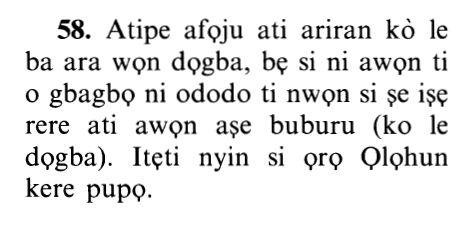40vs58
Select any filter and click on Go! to see results
وَمَا يَسْتَوِي الْأَعْمَى وَالْبَصِيرُ وَالَّذِينَ آمَنُوا وَعَمِلُوا الصَّالِحَاتِ وَلَا الْمُسِيءُ قَلِيلاً مَّا تَتَذَكَّرُونَ
Wama yastawee alaAAma waalbaseeru waallatheena amanoo waAAamiloo alssalihati wala almuseeo qaleelan ma tatathakkaroona
Index Terms
Click to play
Yoruba Translation

Hausa Translation
Kuma makãho da mai gani bã su daidaita kuma waɗanda suka yi ĩmãni suka, aikata ayyukan ƙwarai da mai mũnanãwa bã su daidaita. Kaɗan ƙwarai, kuke yin tunãni.
Asbabu n-Nuzuul (Occasions of Revelation)
Then Allah says:
وَمَا يَسْتَوِي الْأَعْمَى وَالْبَصِيرُ وَالَّذِينَ آمَنُوا وَعَمِلُوا الصَّالِحَاتِ وَلَا الْمُسِيءُ قَلِيلًا مَّا تَتَذَكَّرُونَ ﴿٥٨﴾
And not equal are the blind and those who see; nor are those who believe, and do righteous good deeds, and those who do evil. Little do you remember!
The blind man who cannot see anything is not the same as the sighted man who can see everything as far as his eyesight reaches -- there is a huge difference between them. By the same token, the righteous believers and the immoral disbelievers are not equal.
قَلِيلًا مَّا تَتَذَكَّرُونَ (Little do you remember!),
means, most of the people remember little.
أي كما لا يستوي الأعمى الذي لا يبصر شيئا والبصير الذي يرى ما انتهى إليه بصره بل بينهما فرق عظيم كذلك لا يستوي المؤمنون الأبرار والكفرة الفجار " قليلا ما تتذكرون " أي ما أقل ما يتذكر كثير من الناس .
"وما يستوي الأعمى ولا البصير" لا "والذين آمنوا وعملوا الصالحات" وهو المحسن "ولا المسيء" فيه زيادة لا "قليلا ما تتذكرون" يتعظون بالياء والتاء أي تذكرهم قليل جدا
أي المؤمن والكافر والضال والمهتدي .
I'raab - grammatical analysis of the Qur'an
«وَما» الواو حرف استئناف وما نافية «يَسْتَوِي الْأَعْمى » مضارع وفاعله «وَالْبَصِيرُ» معطوف على الأعمى «وَالَّذِينَ» معطوف على ما قبله «آمَنُوا» ماض وفاعله والجملة صلة «وَعَمِلُوا» معطوف على آمنوا «الصَّالِحاتِ» مفعول به منصوب بالكسرة «وَ» الواو عاطفة «لَا» زائدة لتأكيد النفي «الْمُسِي ءُ» معطوفة على ما قبلها «قَلِيلًا» مفعول مطلق «ما» زائدة «تَتَذَكَّرُونَ» مضارع مرفوع والواو فاعله والجملة مستأنفة
